The JWDA floor lamp by Audo Copenhagen is a delightful luminaire that features a travertine base, brushed brass stem, oval opal glass shade and a knob that functions as a switch and a dimmer. Designed by Jonas Wagell, the contemporary floor lamp was inspired by the ambience of traditional oil lamps. The elegant JWDA provides soft illumination for any space.
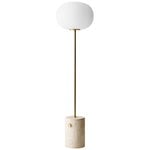
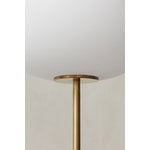
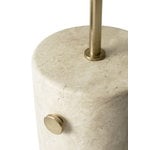
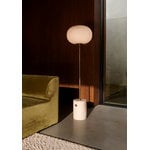
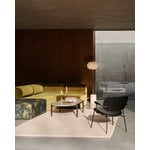
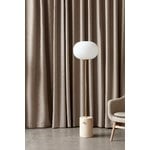
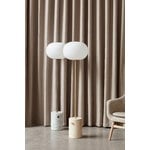
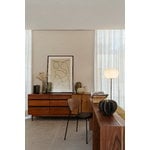
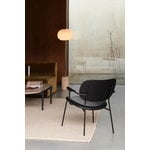
JWDA floor lamp, travertine - brushed brass
Audo Copenhagen
Description
The JWDA floor lamp by Audo Copenhagen is a delightful luminaire that features a travertine base, brushed brass stem, oval opal glass shade and a knob that functions as a switch and a dimmer. Designed by Jonas Wagell, the contemporary floor lamp was inspired by the ambience of traditional oil lamps. The elegant JWDA provides soft illumination for any space.
Product details (22)
- Material
- Travertine, opal glass, brushed brass
- Colour
- Tarvertine, opal, brass
- Width
- 39 cm
- Base diameter
- 21 cm
- Shade diameter
- 39 cm
- Height
- 150 cm
- Bulb base
- E27
- Light source
- Dimmable 8W LED (included)
- Colour temperature
- 2,200 K
- Luminous flux
- 700 lm
- IP rating
- 20
- Protection class
- II
- Voltage
- 220–230 V
- Certifications and labels
- CE, ETL
- Plug
- EU plug
- Cable length
- 250 cm
- Cable colour
- Black
- Cable material
- Textile
- Weight
- 11.3 kg
- Integrated switch
- Yes
- Dimmable
- Yes
- Notes
- Please note that as travertine is a natural material, the colour, veins and finish of the stone may vary from product to product.
- Product ID
Designer
Jonas Wagell (born 1973) is a Swedish architect and designer. He has studied graphic design, marketing, design and architecture in several schools, including Konstfack and Beckmans in Stockholm. Wagell’s products are characterized by playful and insightful forms. He has worked for companies such as Muuto, Normann Copenhagen, Mitab, Bergaform and BSweden. In 2008, Wagell founded the studio JWDA (Jonas Wagell Design & Architecture) in Stockholm.
View all productsReviews (0)
Sustainability
The Product Sustainability Framework, our criteria of sustainable design, helps you find the most sustainable products in our selection. Read below which sustainability criteria this product has met.
Working conditions & labour 7/9
-
Equal opportunities for all employees
-
Commitment to UN Global Compact, fair compensation for all employees
-
Corporate responsibility requirements defined and communicated for suppliers
-
Systematic work for improved inclusion and well-being in the workplace
-
Transparent supply chain
-
Suppliers' compliance to a code of conduct ensured
-
Compliance to the UN Guiding Principles on Business and Human Rights ensured in the supply chain
-
Direct suppliers audited and certified
-
Support for community involvement in the supply chain
Eco-friendly production 8/9
-
Fair and resource-wise water-use in production
-
No incineration or landfilling of returned items
-
No use of endangered species as materials
-
No direct environmental emissions or waste (excl. GHGs) from production
-
The sustainability of direct suppliers' production is addressed and monitored
-
Production and material sourcing that respect biodiversity, animal rights, and natural ecosystems
-
Material-efficient and ecological packaging
-
No potentially harmful chemicals used in own production
-
Positive impact on nature’s well-being through operations that regenerate natural ecosystems
Climate impact 4/8
-
Company's direct greenhouse gas emissions identified and commitment to reduction
-
Product's carbon impact identified and commitment to reduction
-
Guidance on energy- and eco-efficient use of the product
-
Carbon footprint of the product calculated and goals set to reduce it
-
Contribution to climate initiatives beyond the brand’s direct operations
-
Low-carbon or compensated transportation
-
100 % renewable energy in own production and operations
-
Carbon neutral or carbon negative product
Sustainable materials 5/6
-
Sustainable and long-lasting material choices
-
No harmful or hazardous substances
-
Responsible raw material sourcing and production
-
Ecological materials: natural, biodegradable, recyclable or recycled contents
-
Outstanding materials in terms of innovativeness, responsibility, sustainability and circularity: local production or sourcing, 100 % recycled content, C2C-certification etc.
-
Materials suited for circularity: monomaterials, recyclable finishings, renewable or recycled contents etc.
Circular design 4/5
-
High aesthetic quality promoting long-term use of the product
-
Technically durable product design and material choices
-
Design for enduring life-long quality
-
Design and support for product maintenance, repair and upgradability
-
Innovative circular design solutions: circular service system, resale platform, remanufacturing, collection of used products, etc.












